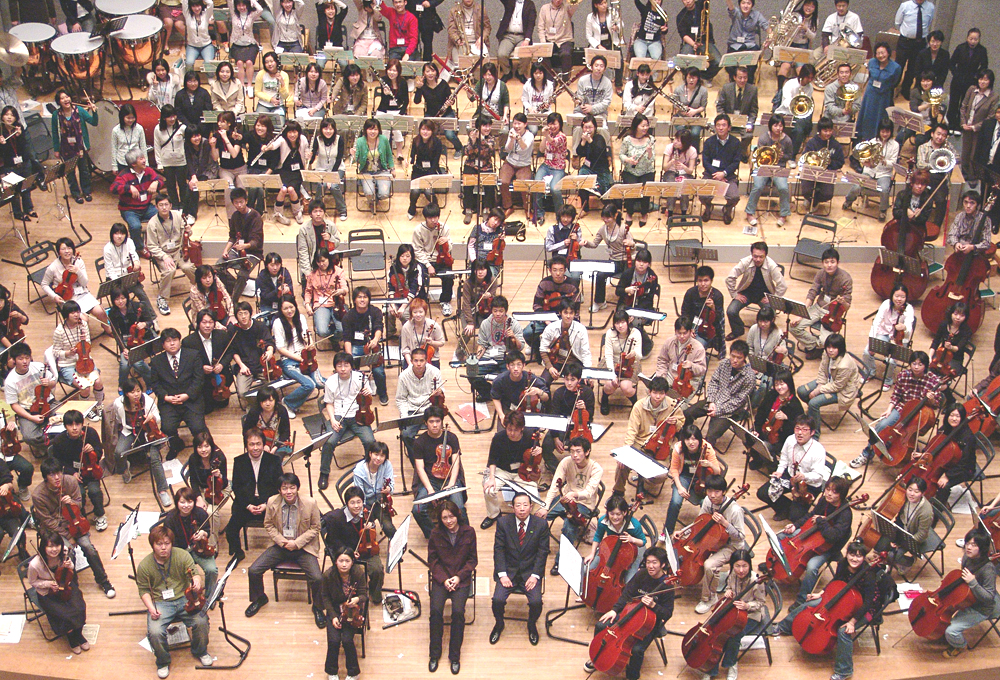<Chapter 3> Activities of Amateur Orchestra and Cultural Activities (3)
“Technical advancement in an amateur orchestra shall aim for creating a particular and special sound of their group.”

“Technical advancement” in an amateur orchestra shall aim for creating a particular and special sound of their group, rather than aiming to sound like a professional orchestra as they used to in the past.
For an amateur, it is not a problem to be immature. What is essential is to see far ahead into the future and be aware of the level that they need to reach, deciding on the sound and way of ensemble particular to the group.
(November 1980)
The joy to experience music by yourself and to inspire people through music cannot be a vain attempt in any era; this relates to the essential matter, a sign of one’s life. In our society today, it is easy to lose your standing position and is difficult for a strong leader to appear. The troublesome fact is that “there is no best way.” In a rapid informational society today, I wonder to what extent are a member of amateur orchestras able to keep their clear sense and consciousness.
What is required of us is to become a cultural group consisting of independent citizens? From this perspective, activities of the amateur orchestra must be in line with a culture of the hometown where their activity base is; the amateur orchestra has no identity if the society does not require any orchestra.
(March 1986)
The kinds of people amateur orchestras need are those who think about their activities and create the next outlook. Music techniques for people who can get ahold of their presence in such a constellation may not be high; it is a matter of time to get better in musical techniques.
(March 1980)
Now those amateur orchestras in Japan are scattered, how could we say that cultural level did rise accordingly? I would like to stop and think for a moment. Am I the only one who has a slight misgiving that “Are not we running at the edge of deep water?” I do admit that amateur orchestras have reached its golden age, but it has only “expanded,” and not “deepened.”
I think people who take part in amateur orchestras face hardships in daily life, which make them tend to have narrow views and become self-righteous. While experiencing joy and pride, there is a tendency to seek self-sufficiency eagerly. In other words, the real misfortune of amateur orchestras is when our efforts and passions seem like card castle and get into Mobius strip.
What is important is for leaders and members of the orchestra, is to always keep in mind of their ideal orchestra, regardless of the situation where they have to caster their surroundings. Sometimes practicing too hard makes them narrow-viewed and fall into the swamp of self-righteousness.
The Orchestra becomes orchestra only when many people cooperate. Therefore, I truly hope that leaders and every single member communicate well with each other and think of themselves from a broader perspective of Japan, excluding impatients, and loving their hometown as they celebrate guardian deity of their birthplace.
(March 1987)
Around the late 1990s, amateur orchestras in Japan have developed their skills and many orchestras, in fact, play difficult pieces that make me surprised. I believe amateur orchestras in Japan have reached the stage of “full maturity.” From now on, which direction shall amateur orchestras head? How can amateur orchestras perform their best and make an ensemble from the bottom of the heart at the same time? I believe it is quite important to take a moment to pause and ask ourselves, “What is it that we are actually doing right now?”
I have been always aiming for the higher level of orchestra and I faced the question where the line lies between the professional and amateur. I believe we have come to a point where we all need to reflect ourselves and work on our inner selves. Thinking both physically and mentally about how the actual playing in the orchestra affects oneself will lead us to a point where there is no boundary between professional and amateur. I would say amateurs could become “artisans” who devote themselves to deepen the understanding of music and contributing to the original sound of the orchestra. I strongly hope that we will become artisan with a “soul” to reflect ourselves with ambitions to improve in every way.
(January 2010)







